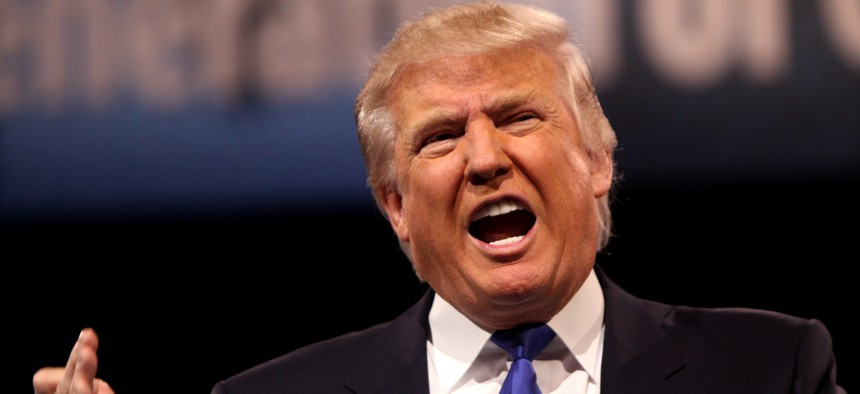
Flickr user Gage Skidmore
Trump, Citing Column, Says NSA, FBI 'Should Not Interfere in our Politics'
The president, just like his predecessors, believes the leaking of classified information is illegal.
President Trump has repeatedly issued announcements and proposals over Twitter, during both the presidential election and the transition period, embracing the medium as a superior means of communicating with the American people compared to relying on traditional media organizations.
White House Press Secretary Sean Spicer has promised that Trump’s tweets will continue: “He has this direct pipeline to the American people, where he can talk back and forth,” Spicer recently explained to WPRI TV in Providence, Rhode Island, adding that Twitter allows him to “put his thoughts out and hear what they’re thinking in a way that no one’s ever been able to do before.”
Thank you to Eli Lake of The Bloomberg View - "The NSA & FBI...should not interfere in our politics...and is" Very serious situation for USA
— Donald J. Trump (@realDonaldTrump) February 15, 2017
The Prompt
President Trump has tweeted six times this morning about news reports that link his associates to Russian intelligence. He has labeled The New York Times and The Washington Post, which have broken most of these stories, as “failing.” He also called MSNBC and CNN “fake news.” Leaks of intelligence agencies have already cost one top Trump aide, Michael Flynn, his job; the leaks are now targeting other Trump associates.
Eli Lake, a Bloomberg View columnist, on Tuesday likened Flynn’s ouster to a “political assassination,” and warned that leaks by intelligence agencies that dictate political outcomes are the hallmarks of a totalitarian state. On Wednesday, he repeated those assertions on Fox & Friends—a show Trump apparently loves.
The Context
The White House said Flynn had lost Trump’s trust because of what he told Vice President Mike Pence and others about the nature of his conversations with Sergey Kislyak, the Russian ambassador to the U.S. In his column, Lake, whom I worked with about a dozen years ago, did not praise Trump—far from it—but he did point out how “intercepts of U.S. officials and citizens are some of the most tightly held government secrets.” Here’s more:
This is for good reason. Selectively disclosing details of private conversations monitored by the FBI or NSA gives the permanent state the power to destroy reputations from the cloak of anonymity. This is what police states do.
In the past it was considered scandalous for senior U.S. officials to even request the identities of U.S. officials incidentally monitored by the government (normally they are redacted from intelligence reports). … The fact that the intercepts of Flynn's conversations with Kislyak appear to have been widely distributed inside the government is a red flag.
Lake goes onto point out that many Trump associates, including Paul Manafort, Carter Page, and Roger Stone, are being investigated for their links to Russian intelligence. But, he adds: “That's all these allegations are at this point: unanswered questions.”
It's possible that Flynn has more ties to Russia that he had kept from the public and his colleagues. It's also possible that a group of national security bureaucrats and former Obama officials are selectively leaking highly sensitive law enforcement information to undermine the elected government. …
In normal times, the idea that U.S. officials entrusted with our most sensitive secrets would selectively disclose them to undermine the White House would alarm those worried about creeping authoritarianism. Imagine if intercepts of a call between Obama's incoming national security adviser and Iran's foreign minister leaked to the press before the nuclear negotiations began? The howls of indignation would be deafening.
Lake points out this is ultimately dangerous, but these sorts of selective leaks aren’t new: They brought down the Nixon presidency, revealed intimate details of what was happening in the Clinton White House, the abuses at Abu Gharaib, as well as the U.S. mass surveillance of its citizens. But they’ve also on occasion been spectacularly wrong: such as when Stephen Hatfill was accused of perpetrating the anthrax attacks, and when Wen Ho-Lee was accused of passing secrets to China.
The Response
The president, just like his predecessors, believes the leaking of classified information is illegal. Indeed, the Obama administration’s record on this is far from stellar.
Trump’s citing of Lake’s column is part of a pattern in which he praises journalists and news organizations that he believes shares his view. (Just this morning he praised Fox & Friends.)
But it’s his labeling of the leaks as “un-American” that might not persuade everyone: Selective leaks from the intelligence communities have been around for years, and the news media would certainly argue that even when those leaks are wrong they sever a larger purpose: If administrations were transparent with how they operate, such leaks would be unnecessary.
(Image via Flickr user Gage Skidmore)






